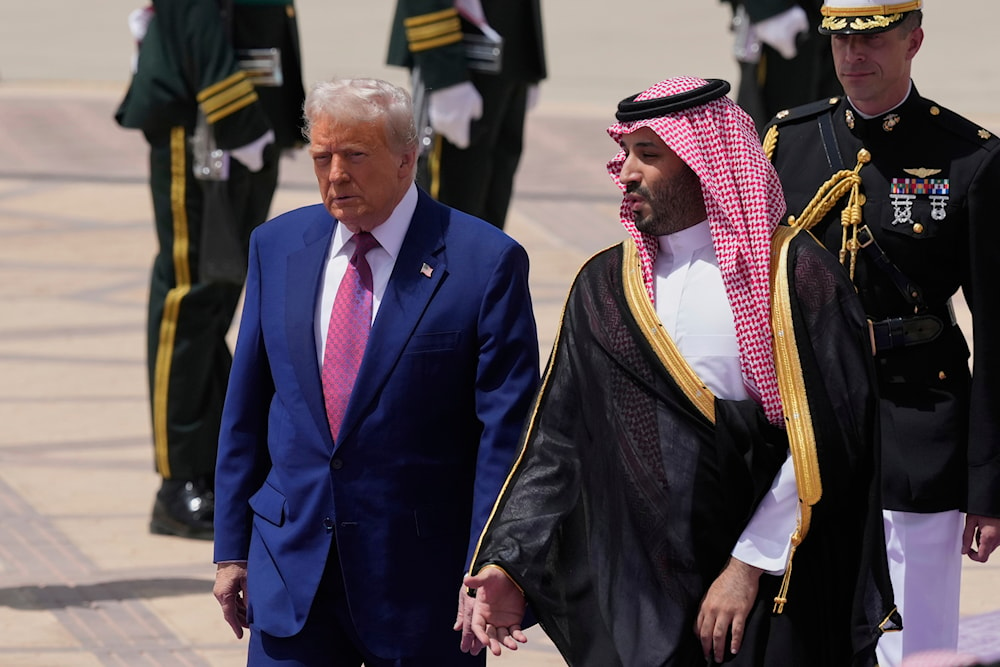Trump lands in KSA on his first regional tour since taking office
US President Donald Trump begins his Gulf tour with a visit to Saudi Arabia, where he meets Crown Prince Mohammed bin Salman to discuss trade deals ahead of the Gulf-US summit in Riyadh.
-

President Donald Trump speaks with Saudi Crown Prince Mohammed bin Salman during an arrival ceremony at the Royal Terminal of King Khalid International Airport in Riyadh, Saudi Arabia, on May 13, 2025. (AP Photo/Alex Brandon)
US President Donald Trump kicked off a four-day Gulf tour on Tuesday in Saudi Arabia, where he was received at King Khalid International Airport by Saudi Crown Prince Mohammed bin Salman.
MBS warmly greeted Trump as he stepped off Air Force One at King Khalid International Airport in the Saudi capital. The two leaders then retreated to a grand hall at the Riyadh airport, where Trump and his aides were served traditional Arabic coffee by waiting attendants wearing ceremonial gun belts.
“I really believe we like each other a lot,” Trump said later during a brief appearance with the crown prince at the start of a bilateral meeting.
US President Donald #Trump arrived in #Riyadh on Tuesday morning and was welcomed by Saudi Crown Prince Mohammad Bin Salman.#SaudiArabia is the first stop in Trump's #MiddleEast tour, where he will later visit Qatar and the UAE. pic.twitter.com/AjlXHP7hZM
— Al Mayadeen English (@MayadeenEnglish) May 13, 2025
Fighter jet escort
The pomp began before Trump even landed. Royal Saudi Air Force F-15s provided an honorary escort for Air Force One as it approached the kingdom’s capital.
Trump and MBS also took part in a lunch at the Royal Court, gathering with guests and aides in an ornate room with blue accents and massive crystal chandeliers.
As he greeted business titans with Trump by his side, Prince Mohammed was animated and smiling.
Trump’s visit to Saudi Arabia marks the first stop in a multi-day regional tour that will include the UAE and Qatar, as Washington seeks to strengthen ties and pursue strategic trade agreements.
He previously described his trip to the Middle East as “historic,” emphasizing his commitment to the security of Saudi Arabia, the UAE, Qatar, and other regional partners, while the White House frames the visit as an economic and diplomatic mission centered around key sectors such as defense, energy, air transportation, and artificial intelligence.
Defense, AI, energy among key sectors in focus
According to regional observers, agreements with the three Gulf countries are expected to cover a range of industries, positioning the visit as a critical moment in reshaping US trade dynamics in the region.
Analysts suggest Trump’s administration is aiming to secure tangible economic and strategic gains during this tour, aligning with his long-standing “America First” agenda.
Prince Mohammed has already committed to some $600 billion in new Saudi investment in the US, but Trump teased $1 trillion would be even better.
That said, the US president is scheduled to participate in the fifth Gulf-US summit on Wednesday, alongside the leaders of the Gulf Cooperation Council (GCC), and the summit is expected to address regional cooperation, security concerns, and trade.
The meeting underscores ongoing efforts to bolster US-Gulf partnerships amid a shifting regional landscape, with economic collaboration at the forefront of discussions.
Trump has reaffirmed his support for preserving the security of Gulf countries and has made clear his administration’s focus on redefining US alliances through mutual benefit.
Trump may join Russia-Ukraine talks
In an unexpected turn, Trump hinted that he might participate in the upcoming Russian-Ukrainian negotiations set to take place in Istanbul on Thursday, aimed at ending the ongoing war between the two sides.
His potential participation would mark a notable diplomatic maneuver amid his Middle East tour, reflecting his continued ambition to position the US at the center of global peacemaking efforts.
According to The Wall Street Journal, Trump appears to be marginalizing "Israel" in his current regional strategy, focusing instead on cultivating deeper ties with Arab Gulf states.
Observers say this signals the rising influence of the “America First” faction within the Republican Party, which prioritizes strategic gains even at the expense of traditional alliances.

 4 Min Read
4 Min Read










